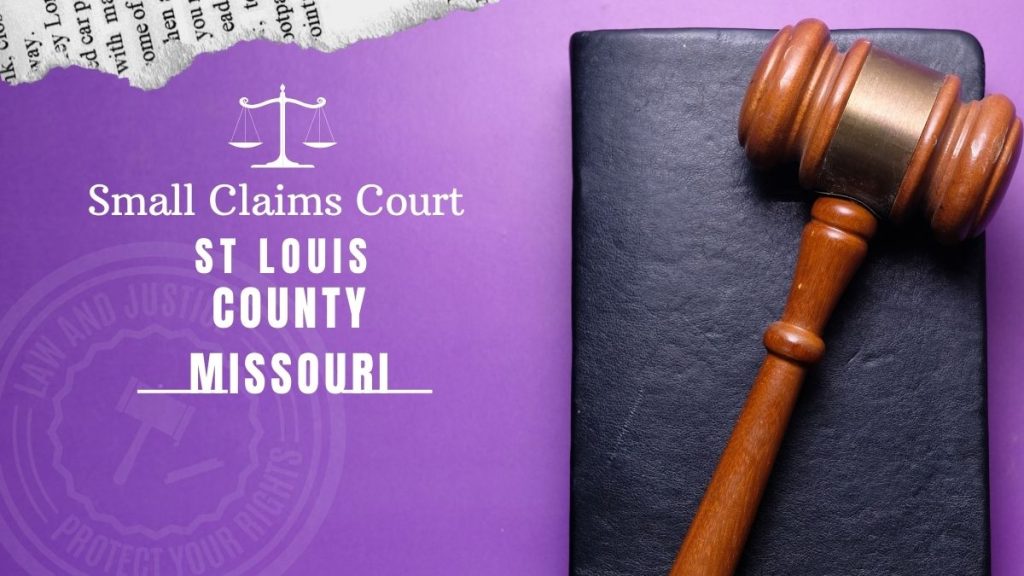It can be difficult to navigate the legal system, particularly for people looking for a solution to a minor disagreement. Small claims courts are essential in offering a streamlined procedure for effectively settling these disputes. This article will explain the nuances of the Small Claims Court St Louis County Missouri, small claims court system, walking you through its processes, advantages, restrictions, and key factors.
Understanding Small Claims Court St Louis County Missouri
What are Small Claims Courts?
Small claims courts are specialized legal settings created to settle disputes over modest financial amounts. In contrast to conventional court hearings, these lawsuits typically entail concerns like outstanding bills, property damage, or contract violations and offer a streamlined and expedited approach.
Key Features of Small Claims Courts
Limited Monetary Jurisdiction: Depending on the jurisdiction, small claims courts deal with disputes involving relatively small sums of money. The maximum sum normally ranges from $3,000 to $5,000 in St. Louis County, Missouri.
Informality: Compared to ordinary courts, the proceedings are less formal. In order to increase access to justice, parties frequently represent themselves without the assistance of an attorney.
Speedy Resolution: Small claims cases are intended to be settled promptly so that parties can come to an agreement without enduring protracted legal disputes.
Filing a Small Claims Case
Initiating a Case
Gather Evidence: Gather all pertinent letters, receipts, pictures, and documents that pertain to the issue. In order to effectively convey your case, they will be essential.
Filing the Complaint: To register a complaint, go to the St. Louis County Courthouse or use its online site. Describe the dispute in detail, the amount at issue, and the defendant’s information
Pay Filing Fee: When a case is first filed, there is a filing fee. If you are unable to pay the cost, you can be qualified for a fee waiver.
Serving the Defendant
Summons and Complaint: The defendant is informed of the lawsuit and the court date through a summons that the court issues together with a copy of the complaint.
Serving the Defendant: The summons and complaint must be delivered to the defendant, either personally or through a process server, sheriff’s officer, or certified mail.
The Court Hearing
Preparing for the Hearing
Evidence Presentation: Prepare a brief, precise sketch of your argument while organizing your evidence. Prepare to provide your perspective on the situation.
Witnesses: Make sure your witnesses are available on the hearing date if they can testify in your favor.
The Hearing Process
Mediation: To encourage parties to come to a mutually agreeable resolution, some courts mandate mediation before the hearing.
Presenting Your Case: Inform the judge of your position during the hearing. Give testimony, name witnesses, and address any queries.
Defendant’s Response: The defendant will also have a chance to share their perspective and refute your allegations.
Obtaining a Judgment
Judgment Issuance: The judge will issue a ruling if they find in your favor. This specifies the sum granted as well as any other actions the defendant needs to take.
Collecting the Judgment: You might need to take additional legal action to get what you are entitled if the defendant refuses to voluntarily comply with the verdict.
Conclusion
In St. Louis County, Missouri, navigating the small claims court system can be a practical choice for quickly resolving minor disagreements. You can seek a fair resolution without the difficulties of conventional litigation if you comprehend the procedure, rigorously prepare your case, and present your evidence persuasively.
Frequently Asked Questions (FAQs)
Can I hire an attorney for a small claims case in St. Louis County?
You have the option to employ a lawyer for your small claims case, however it is not required. Due to the informal nature of the proceedings, the majority of parties, however, represent themselves.
What if the defendant doesn’t show up for the hearing?
You have the option to employ a lawyer for your small claims case, however it is not required. Due to the informal nature of the proceedings, the majority of parties, however, represent themselves.
Can I appeal a small claims court decision in St. Louis County?
A small claims court judgement may be appealed, although there are just a few possible grounds. If you intend to appeal, it is advised that you get legal counsel.
How long does it take to get a judgment in a small claims case?
Although the time frame can change, small claims cases are intended to be settled quickly. The verdict can be delivered to you immediately after the hearing or on the same day.
What types of cases are not suitable for small claims court?
Small claims court is typically not appropriate for cases involving intricate legal difficulties, large sums of money, or particular categories of conflicts (such family law proceedings).







